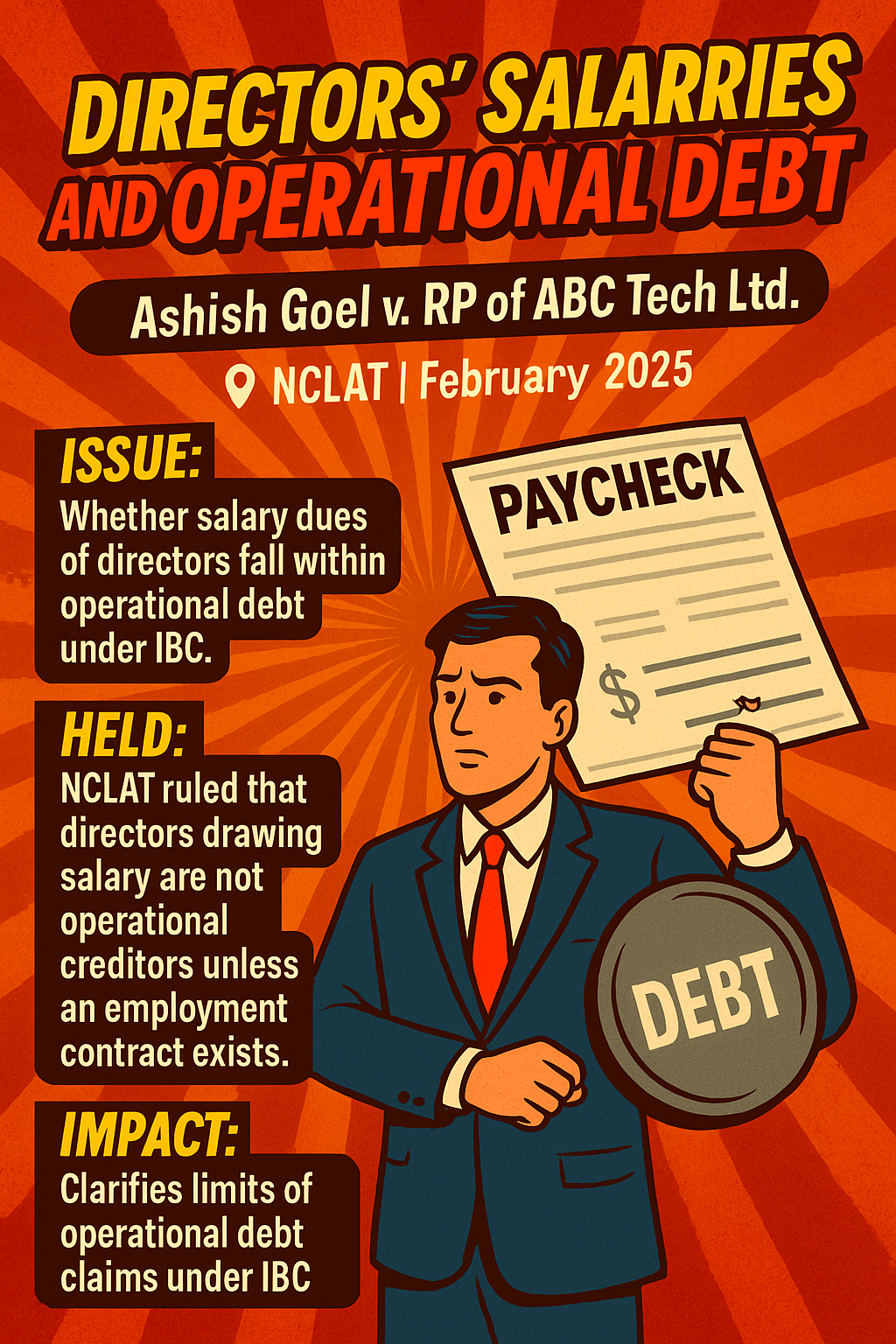
In Ashish Goel v. RP of ABC Tech Ltd. (NCLAT, February 2025), the National Company Law Appellate Tribunal (NCLAT) delivered a key ruling clarifying whether salary dues of directors can be claimed as operational debt under the Insolvency and Bankruptcy Code (IBC), 2016.
Whether a director, drawing remuneration, qualifies as an operational creditor for claiming unpaid salary during the Corporate Insolvency Resolution Process (CIRP).
Directors are not operational creditors by default.
NCLAT held that salary dues of directors cannot be treated as operational debt unless there is a formal employment contract defining their role and nature of employment.
Distinction Between Remuneration and Employment Salary:
A director may receive remuneration for his fiduciary role, but that does not automatically create an employer-employee relationship triggering operational debt claims.
Clarifies the boundary of “operational debt” claims under IBC, particularly concerning promoters, directors, and board members.
Provides legal clarity to Resolution Professionals (RPs) and Creditors’ Committees (CoC) in vetting salary-related claims of directors during CIRP.
Aligns with the principle that IBC is meant to address bona fide creditor claims—not internal corporate remunerations without formal employment relationships.
Ensure clear employment contracts are executed for directors performing executive roles, especially if salary entitlements are to be protected during insolvency proceedings.
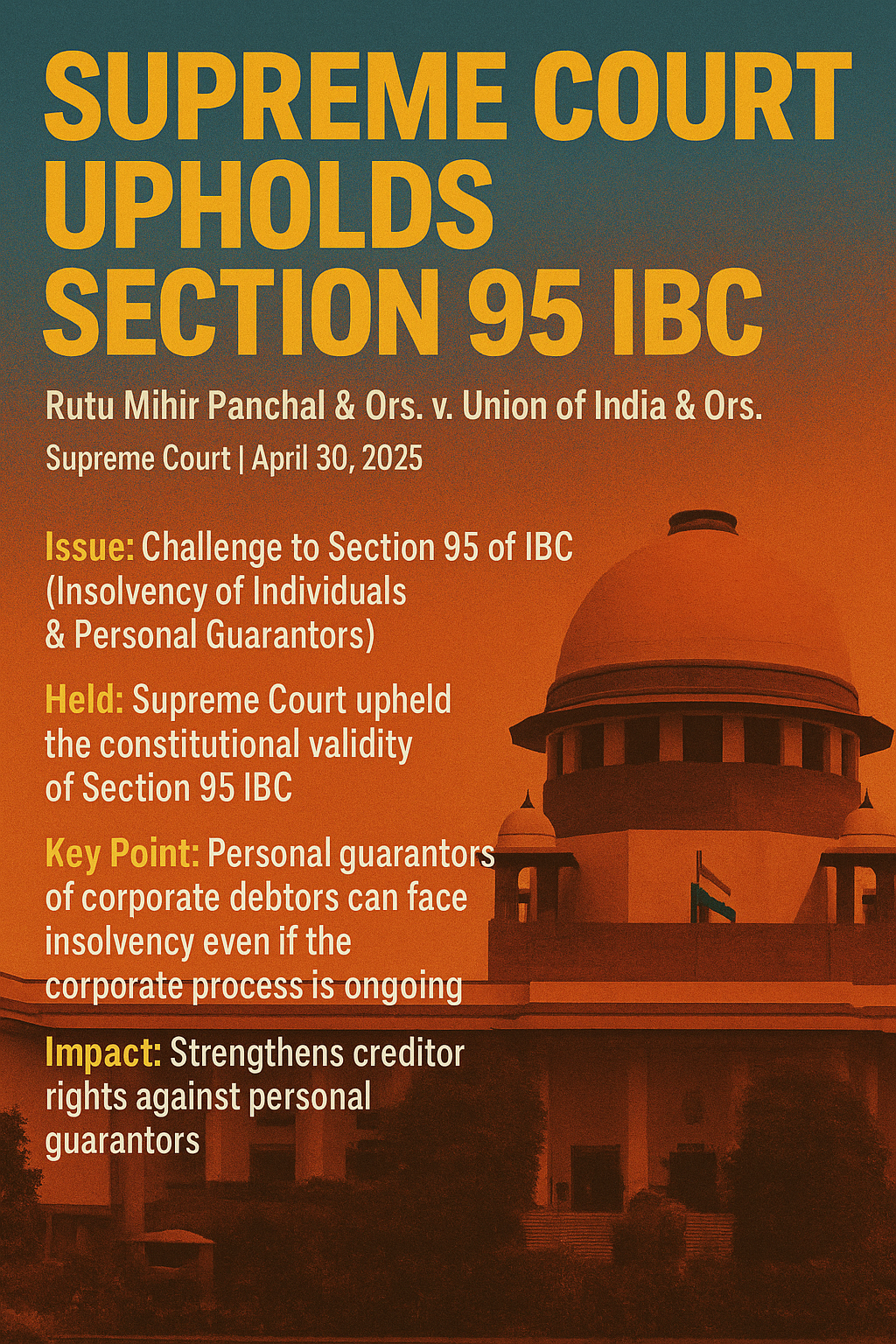
In a landmark judgment on April 30, 2025, the Supreme Court of India upheld the constitutional validity of Section 95 of the Insolvency and Bankruptcy Code (IBC), 2016 in the case of Rutu Mihir Panchal & Ors. v. Union of India & Ors.
Issue: Challenge to the vires of Section 95 of IBC, which allows insolvency proceedings against individuals and personal guarantors of corporate debtors, even when the corporate insolvency resolution process (CIRP) is ongoing.
Held: The Supreme Court affirmed that Section 95 IBC is constitutionally valid and does not infringe upon personal guarantors' rights.
Independent Insolvency for Personal Guarantors:
Personal guarantors are not immune from insolvency proceedings simply because the corporate debtor is undergoing CIRP. Their liability is co-extensive and can be triggered simultaneously.
Creditors' Rights Strengthened:
The ruling empowers creditors to proceed against personal guarantors, enhancing recovery avenues and enforcing guarantees more effectively.
Reinforcement of IBC's Objective:
The judgment underlines that the IBC aims at comprehensive insolvency mechanisms, covering both corporate and personal guarantors, ensuring holistic resolution and recovery.
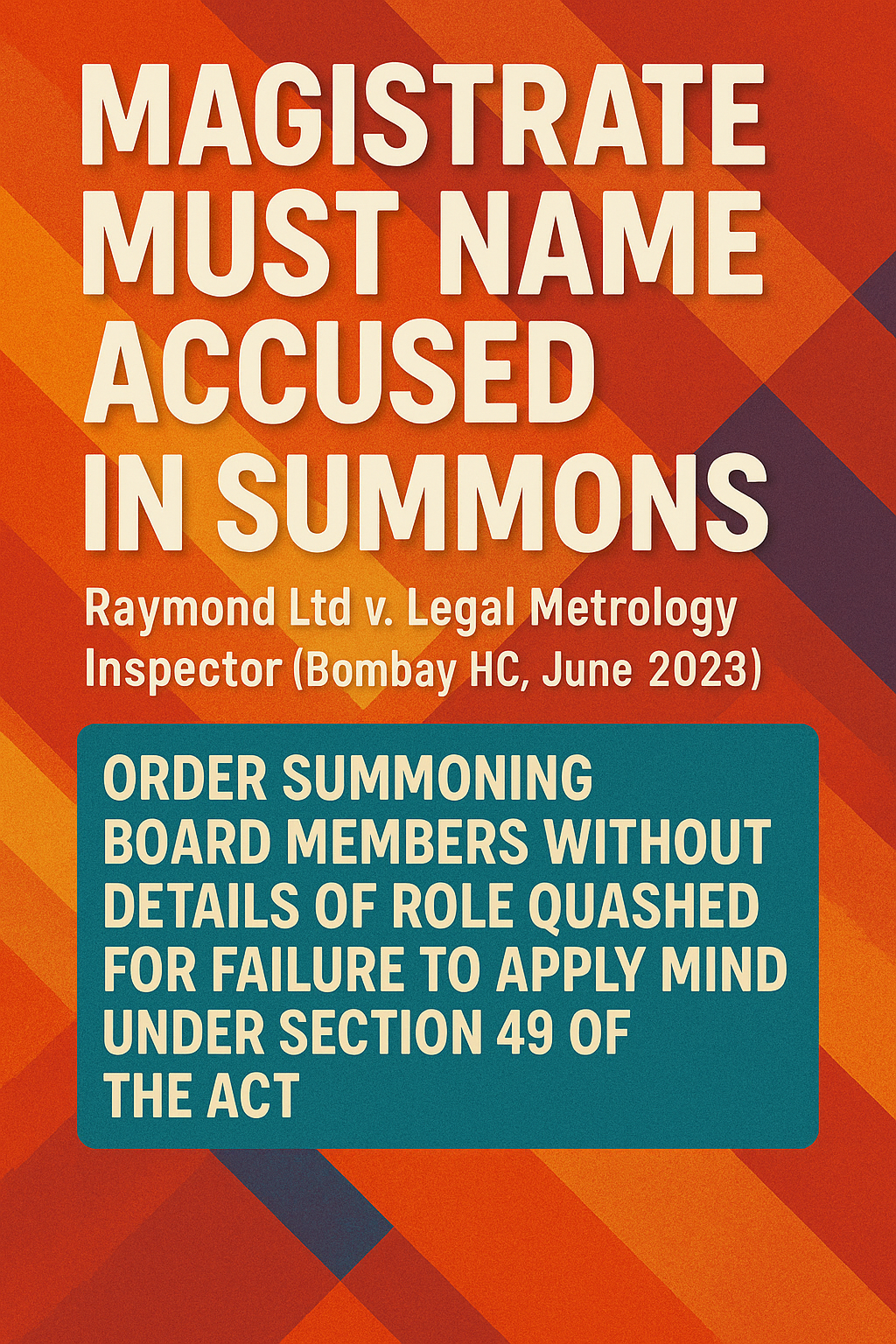
In Raymond Ltd. v. Legal Metrology Inspector (Bombay High Court, June 2023), the court quashed summons issued to board members where the complaint lacked specific allegations of their individual roles and responsibilities under Section 49 of the Legal Metrology Act, 2009.
Magistrate Must Apply Judicial Mind Before Summoning Accused:
The court emphasized that summoning company directors or board members without mentioning their role in the alleged violation amounts to non-application of mind.
Summoning Order Must Specify Accused’s Role:
Blanket orders against the entire board, without any details of how each member was responsible for the day-to-day operations or the contravention, are legally unsustainable.
Section 49 of Legal Metrology Act:
This section mandates that only persons who were "in-charge and responsible" for the conduct of business can be proceeded against. The prosecution must provide prima facie material to justify their involvement.
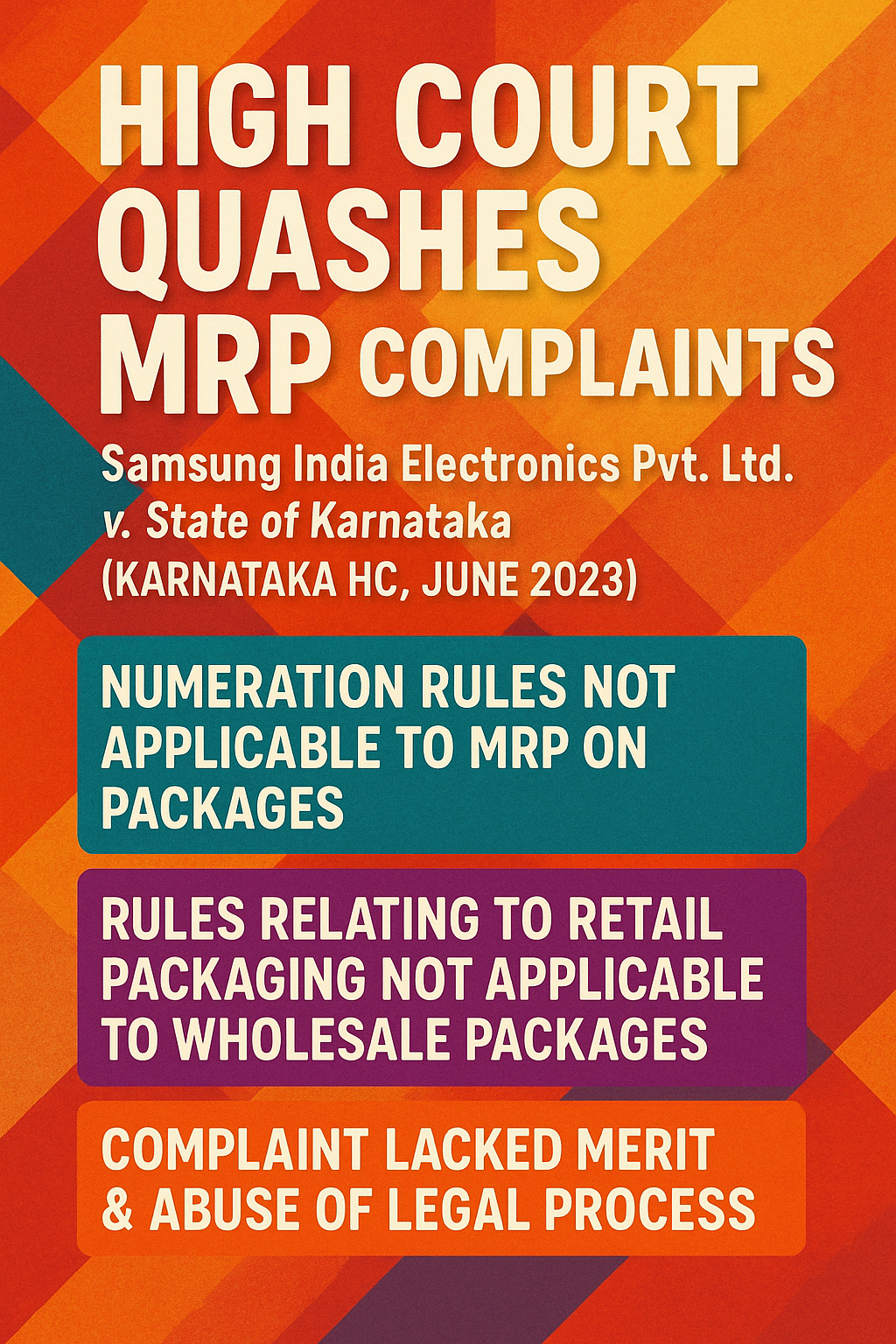
In a significant judgment, the Karnataka High Court (June 2023) quashed MRP-related complaints against Samsung India Electronics Pvt. Ltd., providing clarity on the scope of packaging and labeling rules under the Legal Metrology Act.
Case:
Samsung India Electronics Pvt. Ltd. v. State of Karnataka
Karnataka High Court, June 2023
Numeration Rules Not Applicable to MRP on Packages:
The Court held that numeration requirements under the Legal Metrology (Numeration) Rules do not extend to the declaration of MRP on product packages.
Retail Packaging Rules Not Applicable to Wholesale Packages:
Packaging and labeling mandates for retail consumer packages cannot be mechanically applied to wholesale or bulk packages meant for institutional or business sales.
Complaint Lacked Merit & Abuse of Legal Process:
The High Court observed that the complaint was devoid of substance and an evident misuse of legal mechanisms, aimed at harassing the company without genuine cause.
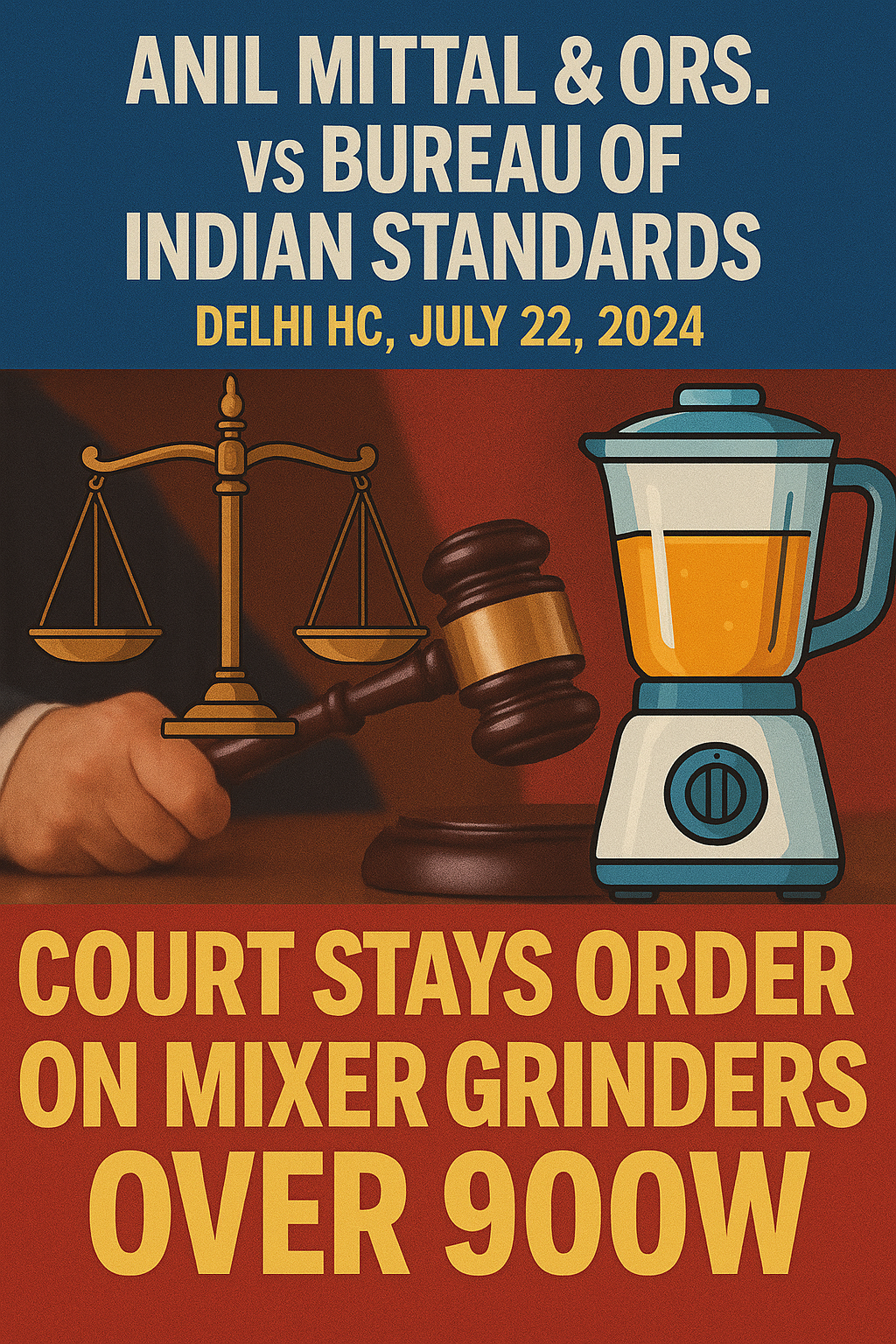
Case: Anil Mittal & Ors. v. Bureau of Indian Standards (BIS)
Delhi High Court | Date: July 22, 2024
Background:
BIS had mandated certification for mixer grinders above 900 watts, citing safety and standardization concerns under the Compulsory Registration Scheme (CRS). Manufacturers challenged this directive.
Court’s Interim Relief:
The Delhi High Court granted a stay on the BIS order—giving a breather to manufacturers and importers dealing with high-powered mixer grinders.
Why This Matters:
Thousands of small appliance manufacturers were facing potential non-compliance penalties.
The stay allows the industry to re-evaluate design, labeling, and supply chains without immediate enforcement.
It also raises questions about scope, timing, and consultation in BIS enforcement.
Industry Impact:
A temporary pause—but not a permanent exemption. The legal outcome may shape the future of BIS's regulatory powers in home appliances.
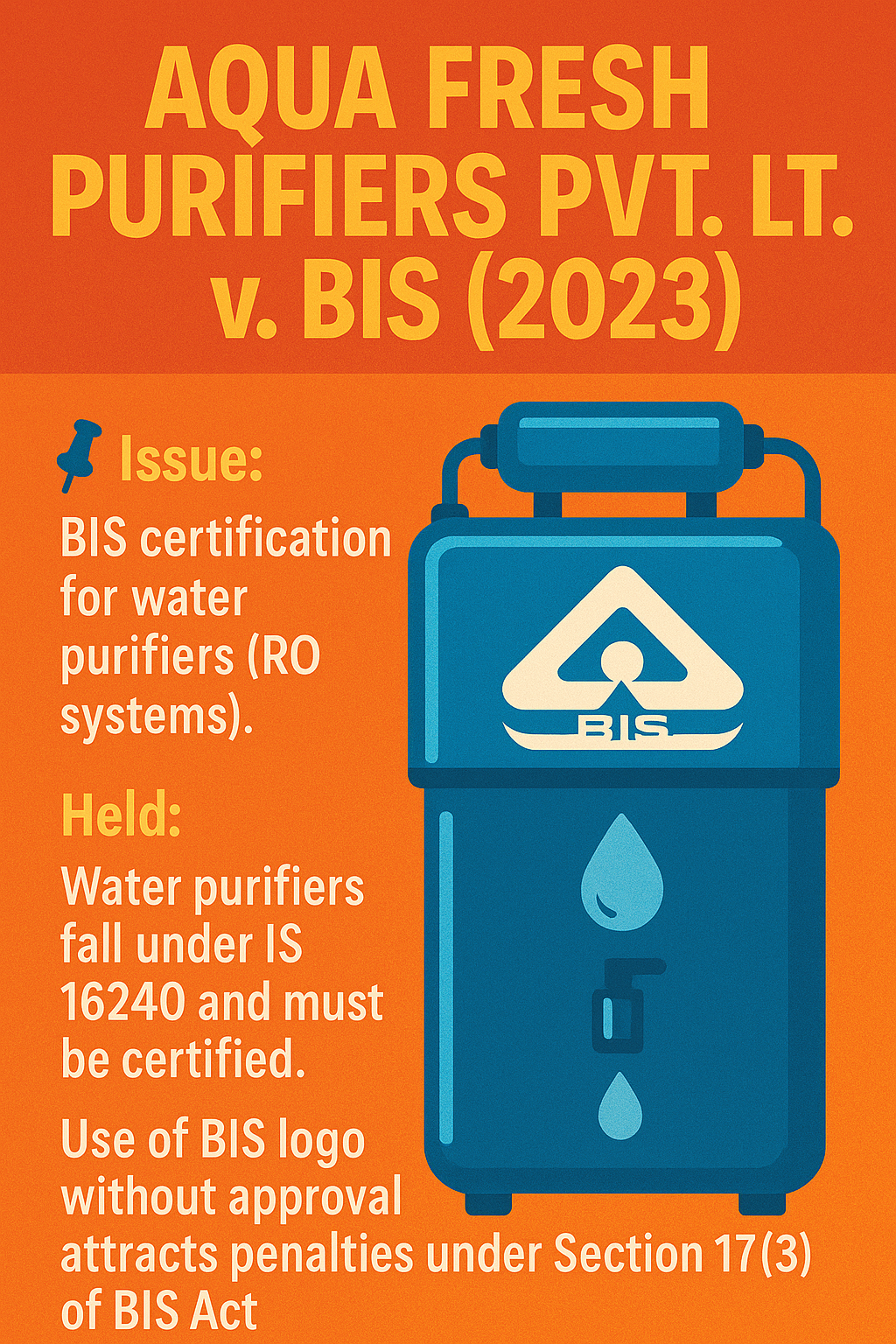
Case: Aqua Fresh Purifiers Pvt. Ltd. v. BIS (2023)
Issue:
Whether RO water purifiers require mandatory BIS certification and whether the BIS logo can be used without approval.
Held:
Water purifiers fall under IS 16240 and must be BIS certified.
Unauthorized use of the BIS logo triggers penalties under Section 17(3) of the BIS Act.
The court reinforced that quality assurance cannot be compromised for essential household items like RO systems.
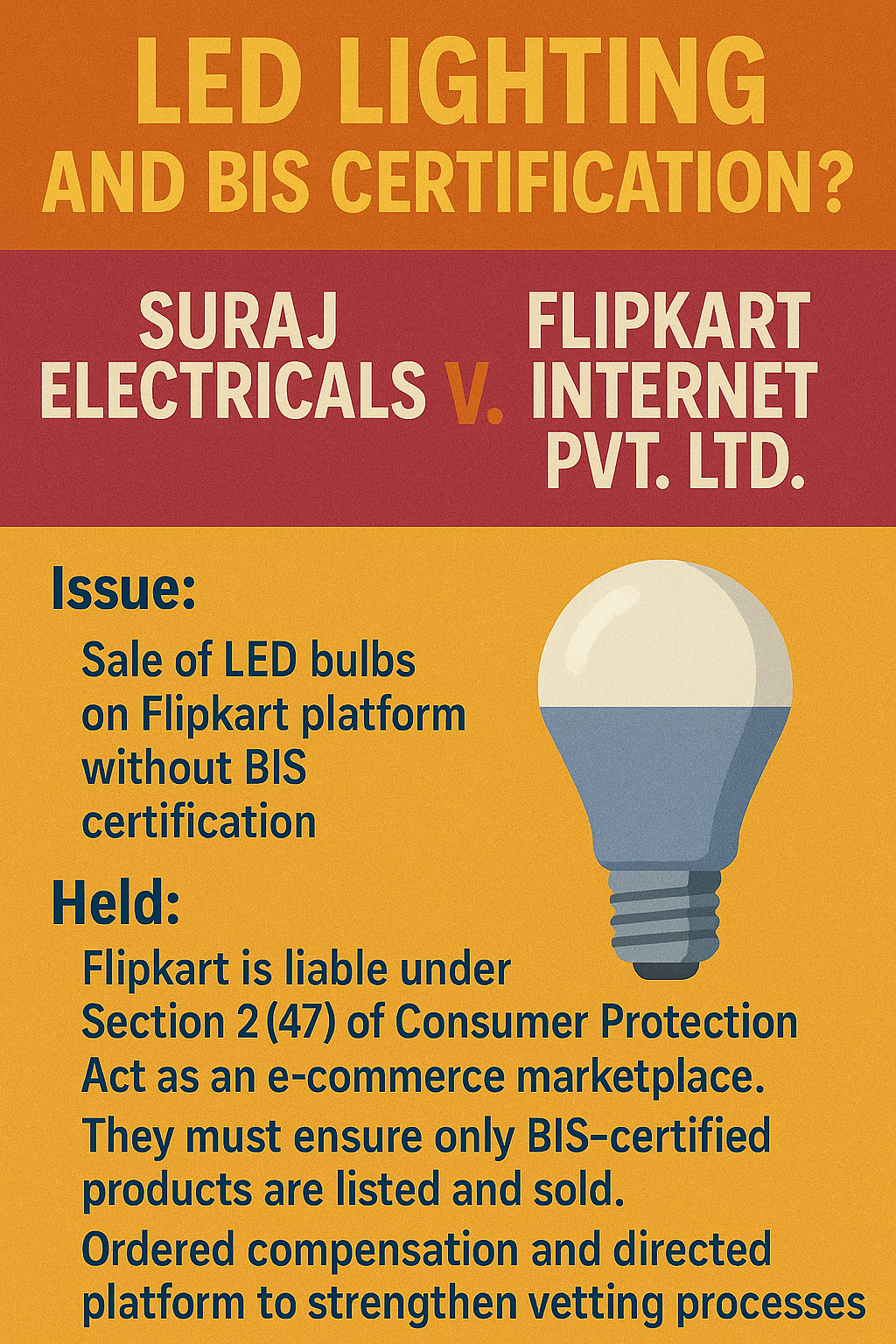
Case: Suraj Electricals v. Flipkart Internet Pvt. Ltd.
In a significant development around consumer safety and regulatory enforcement, Flipkart was held liable for allowing the sale of non-BIS certified LED bulbs on its platform.
Issue:
Suraj Electricals challenged the sale of LED bulbs without BIS certification on Flipkart, raising concerns about product safety and regulatory compliance.
Held:
Flipkart found liable under Section 2(47) of the Consumer Protection Act, 2019.
As an e-commerce marketplace, Flipkart is duty-bound to ensure that only BIS-certified products are listed and sold.
The platform was directed to pay compensation and strengthen its product vetting mechanisms.
Held:
Flipkart found liable under Section 2(47) of the Consumer Protection Act, 2019.
As an e-commerce marketplace, Flipkart is duty-bound to ensure that only BIS-certified products are listed and sold.
The platform was directed to pay compensation and strengthen its product vetting mechanisms.
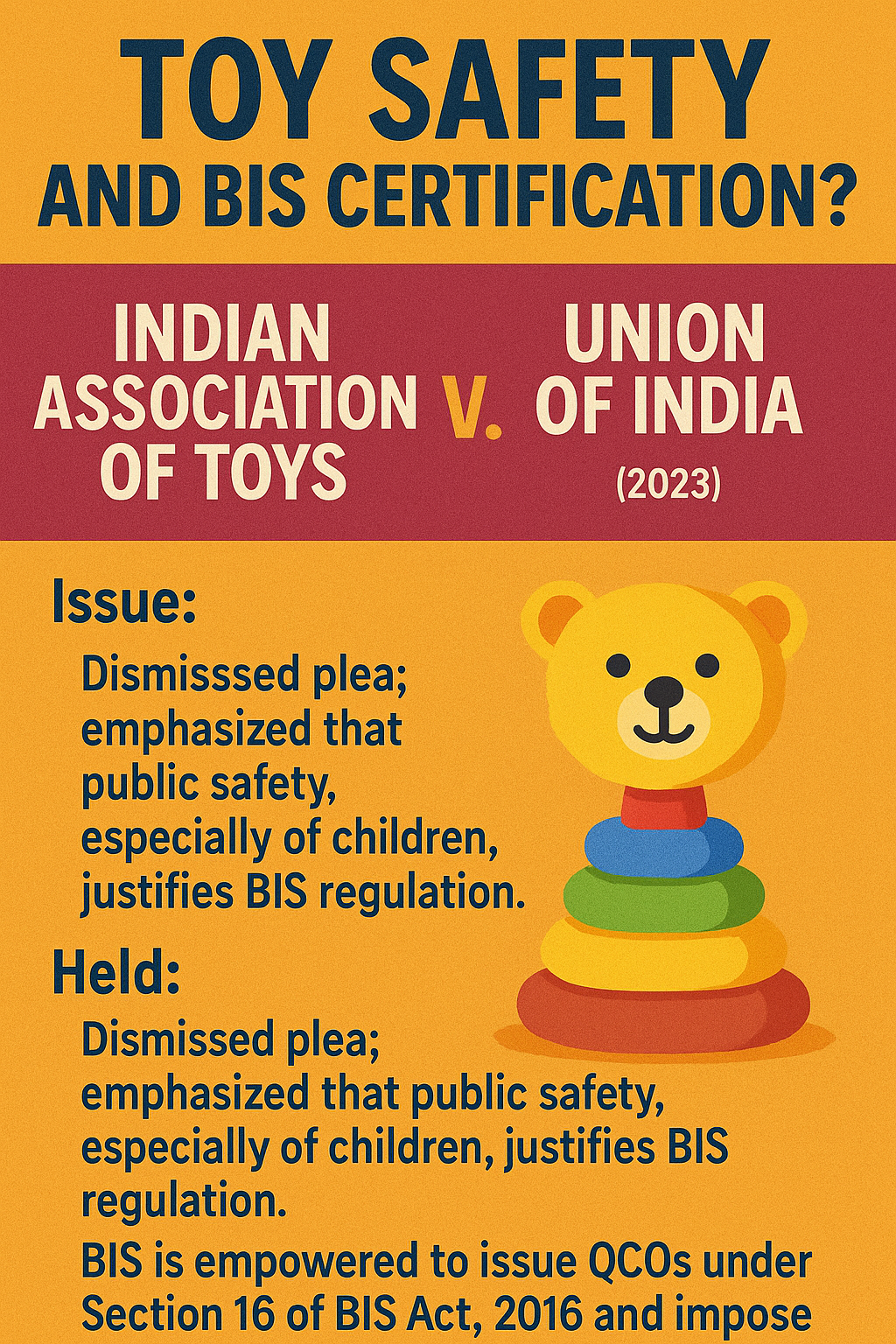
Case: Indian Association of Toys v. Union of India (2023)
In a landmark judgment prioritizing child safety, the court dismissed a petition filed by the Indian Association of Toys challenging mandatory BIS certification for toys.
Issue Raised:
The petitioners argued that mandatory BIS standards and Quality Control Orders (QCOs) were burdensome and restricted trade.
Court’s Verdict:
Plea dismissed in favor of public interest.
Emphasized that children’s safety takes precedence over commercial concerns.
Reaffirmed BIS’s authority to issue QCOs under Section 16 of the BIS Act, 2016 and enforce standards for toy safety.
Why This Matters:
Reinforces India’s move toward international-quality safety norms for toys
Protects millions of children from hazardous, non-compliant toys
Supports BIS’s proactive role in consumer protection through strict enforcement
Takeaway for Industry:
Compliance with BIS standards is not optional—it’s essential for those manufacturing, importing, or selling toys in India.
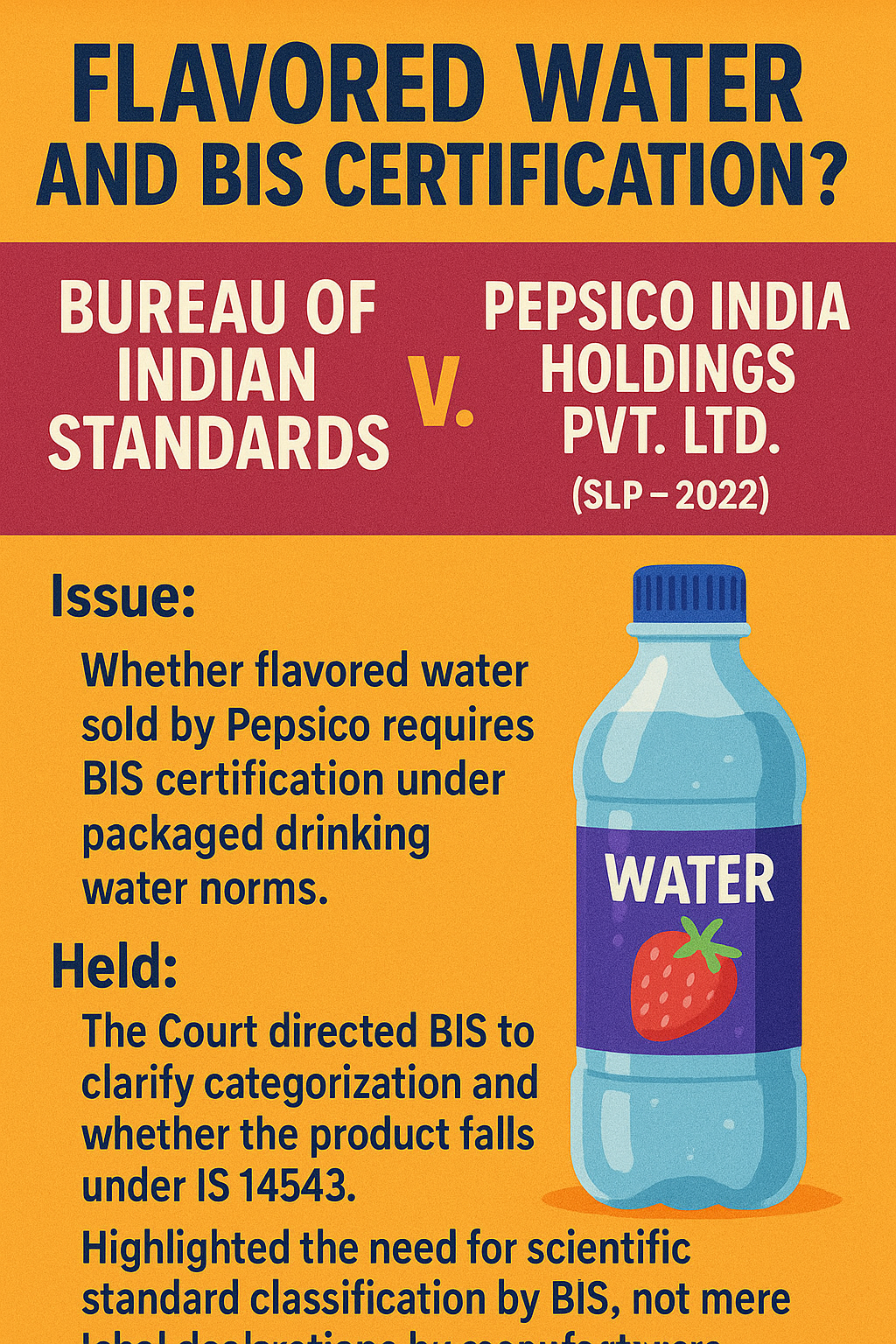
Case: Bureau of Indian Standards v. Pepsico India Holdings Pvt. Ltd.
Special Leave Petition (SLP) – 2022
Can flavored water be treated as packaged drinking water under IS 14543? This was the key question in a significant legal standoff between Pepsico India and the Bureau of Indian Standards (BIS).
Issue: Whether BIS certification is mandatory for flavored water under existing packaged drinking water norms.
Court’s Holding:
The Court did not issue a blanket ruling, but instead directed BIS to:
Scientifically clarify the categorization of flavored water
Determine whether it falls under IS 14543 (Indian Standard for packaged drinking water)
Avoid relying solely on label descriptions and assess product composition for classification
Key Takeaway:
This case highlights the need for nuanced, scientific classification of food and beverage products, rather than broad regulatory assumptions. It also prompts BIS to refine its certification scope in line with industry innovation.
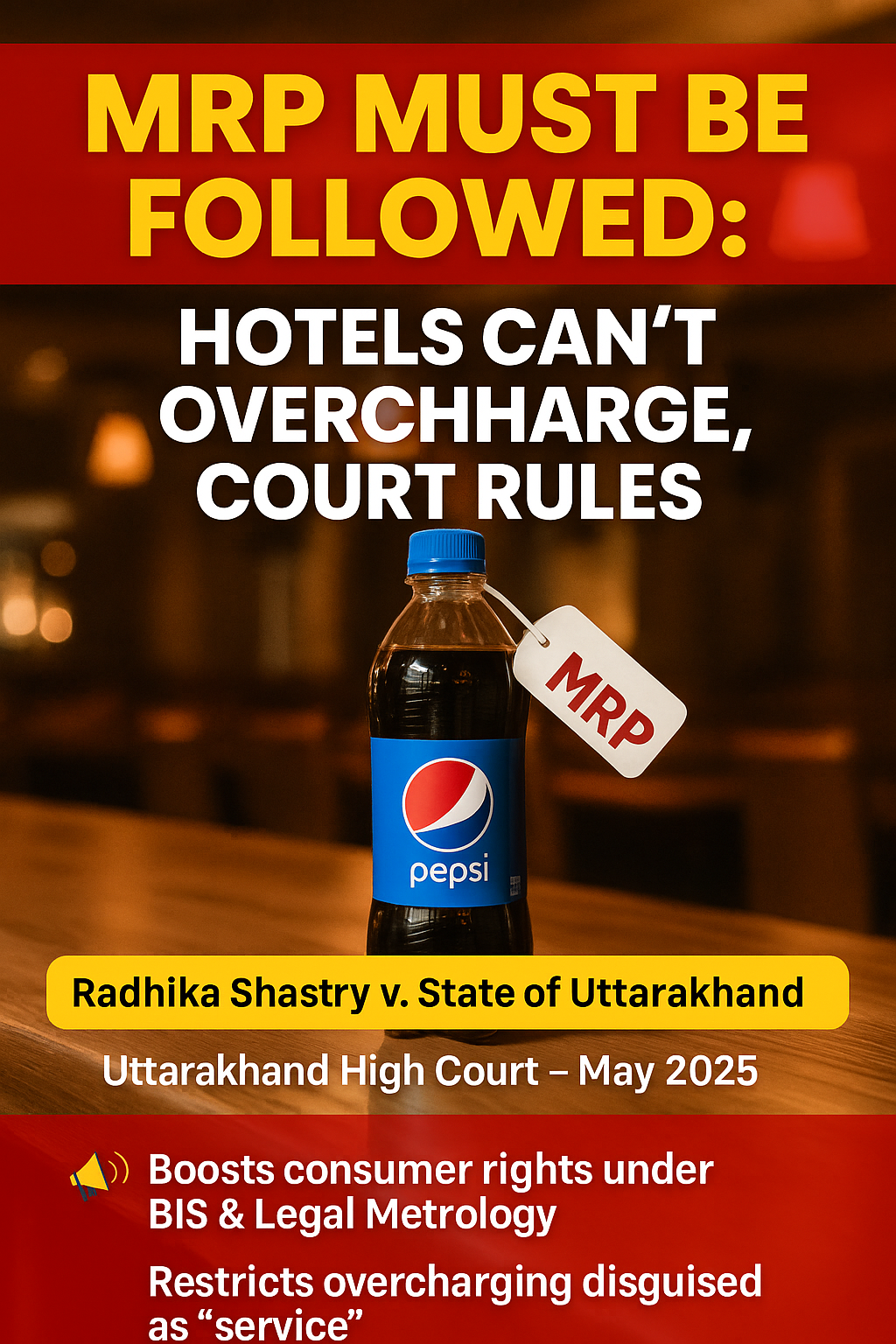
Case: Radhika Shastry v. State of Uttarakhand
Uttarakhand High Court – May 2025
In a key consumer protection ruling, the Uttarakhand High Court has reinforced the sanctity of the Maximum Retail Price (MRP), making it clear that hotels, restaurants, and service outlets cannot charge above MRP by disguising it as a “service fee.”
Case Outcome:
The Court upheld consumer rights under the BIS and Legal Metrology framework, curbing the trend of inflated prices on bottled water, soft drinks, and packaged goods in service establishments.
Overcharging = Violation of MRP rules, no matter the location.
Why This Matters:
Prevents exploitation of customers in premium service environments
Aligns enforcement with consumer protection laws
Enhances awareness on transparent pricing under the Legal Metrology Act
Impact:
Boosts legal accountability in the hospitality sector
Empowers consumers to report price violations
Signals zero tolerance for deceptive billing practices
Takeaway:
Whether at a roadside stall or a 5-star hotel, MRP is not optional. Courts are making it clear—consumer rights are non-negotiable
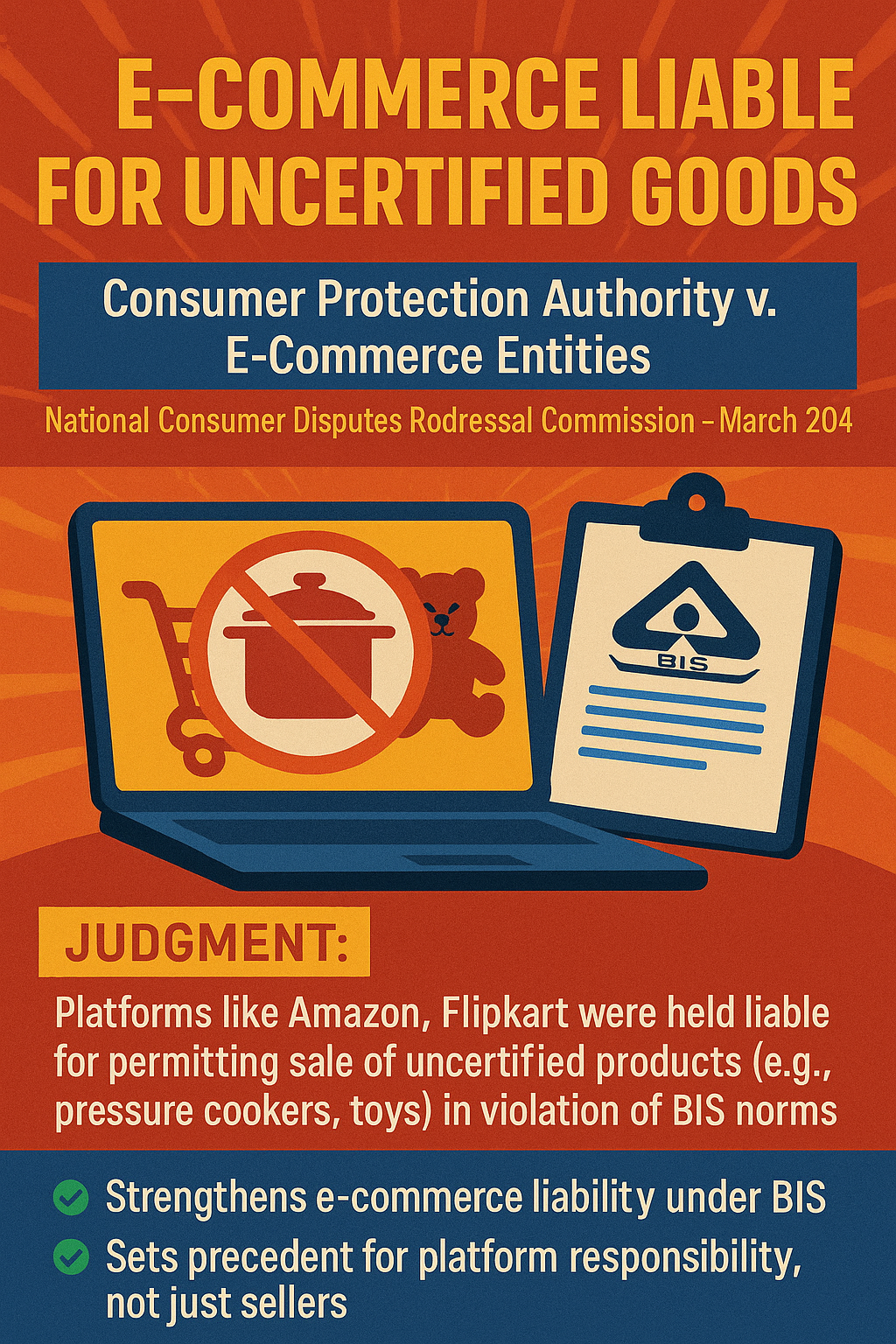
Case: Consumer Protection Authority v. E-Commerce Entities
Commission: National Consumer Disputes Redressal Commission (NCDRC) – March 2024
In a significant consumer protection ruling, the NCDRC held platforms like Amazon and Flipkart accountable for permitting the sale of uncertified products (e.g., pressure cookers, toys) in violation of mandatory BIS norms.
Judgment Highlights:
E-commerce platforms were held liable, not just the individual sellers.
The ruling affirms that platforms must actively monitor compliance with Indian quality standards.
Key Impacts:
Strengthens e-commerce liability under the BIS framework
Shifts accountability from just sellers to platforms
Sets a powerful precedent for regulatory enforcement and consumer safety
Takeaway:
Digital marketplaces can no longer be passive intermediaries. They are now active stakeholders in ensuring product certification and compliance. This decision reinforces BIS’s mission to uphold product safety and quality in the digital economy.
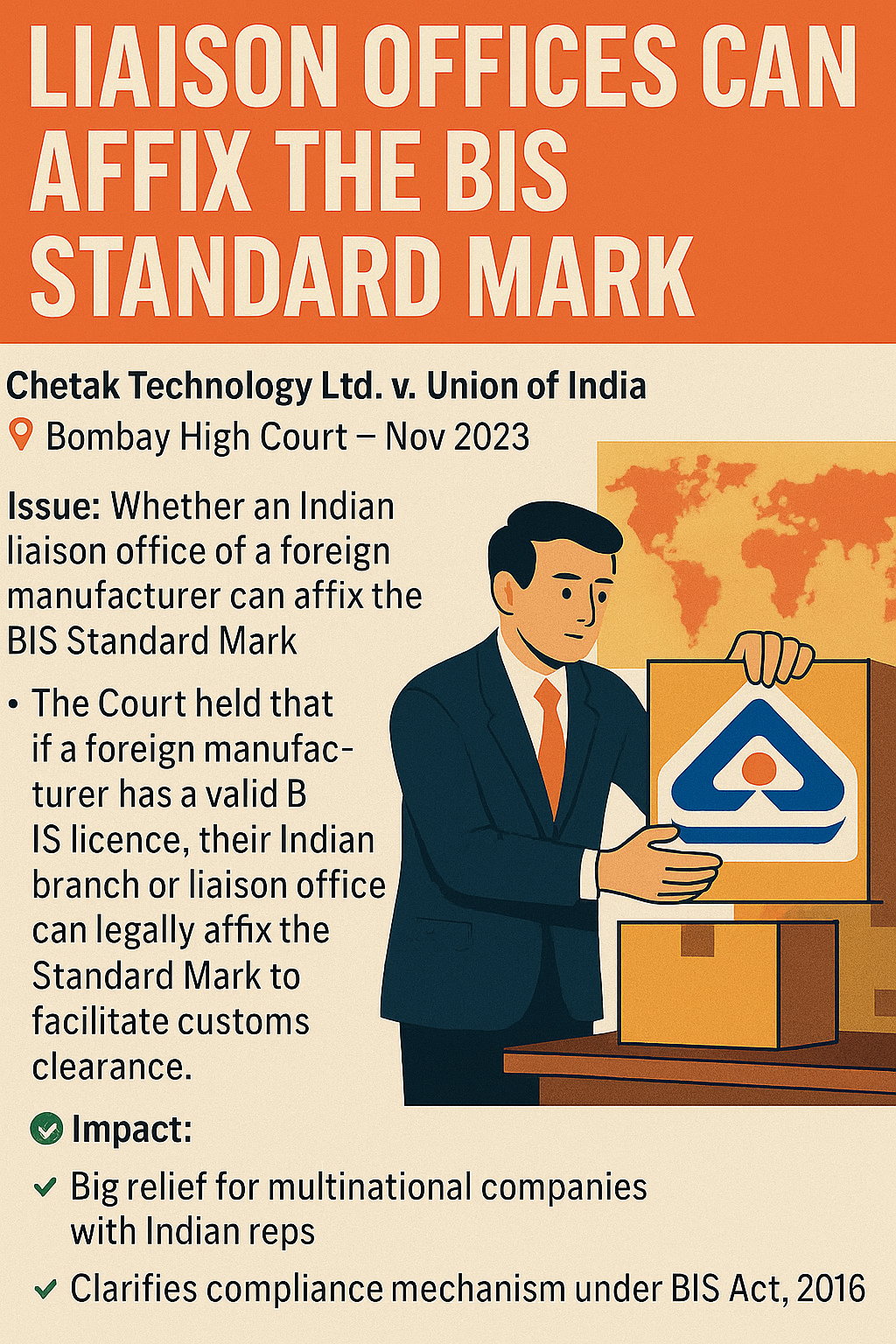
Case: Chetak Technology Ltd. v. Union of India
Bombay High Court | November 2023
In a significant ruling, the Bombay High Court confirmed that Indian liaison offices of foreign manufacturers can legally affix the BIS Standard Mark to their products, provided they hold a valid BIS licence.
Key Issue:
Whether a liaison office of a foreign company in India could apply the BIS Standard Mark on certified products to smoothen customs clearance and regulatory processes.
Court’s Decision:
If the foreign manufacturer possesses a valid BIS licence, their liaison or branch office in India is legally permitted to affix the mark, ensuring compliance with BIS regulations and facilitating faster customs clearance.
Why this matters:
A big relief for multinationals with Indian offices
Clarifies compliance under the BIS Act, 2016
Reduces confusion and delays for importers and exporters
Supports smoother operations for companies engaging in cross-border trade
Key Takeaway:
Multinational manufacturers should ensure their liaison offices are aware of this clarity so they can leverage it for more efficient regulatory compliance.
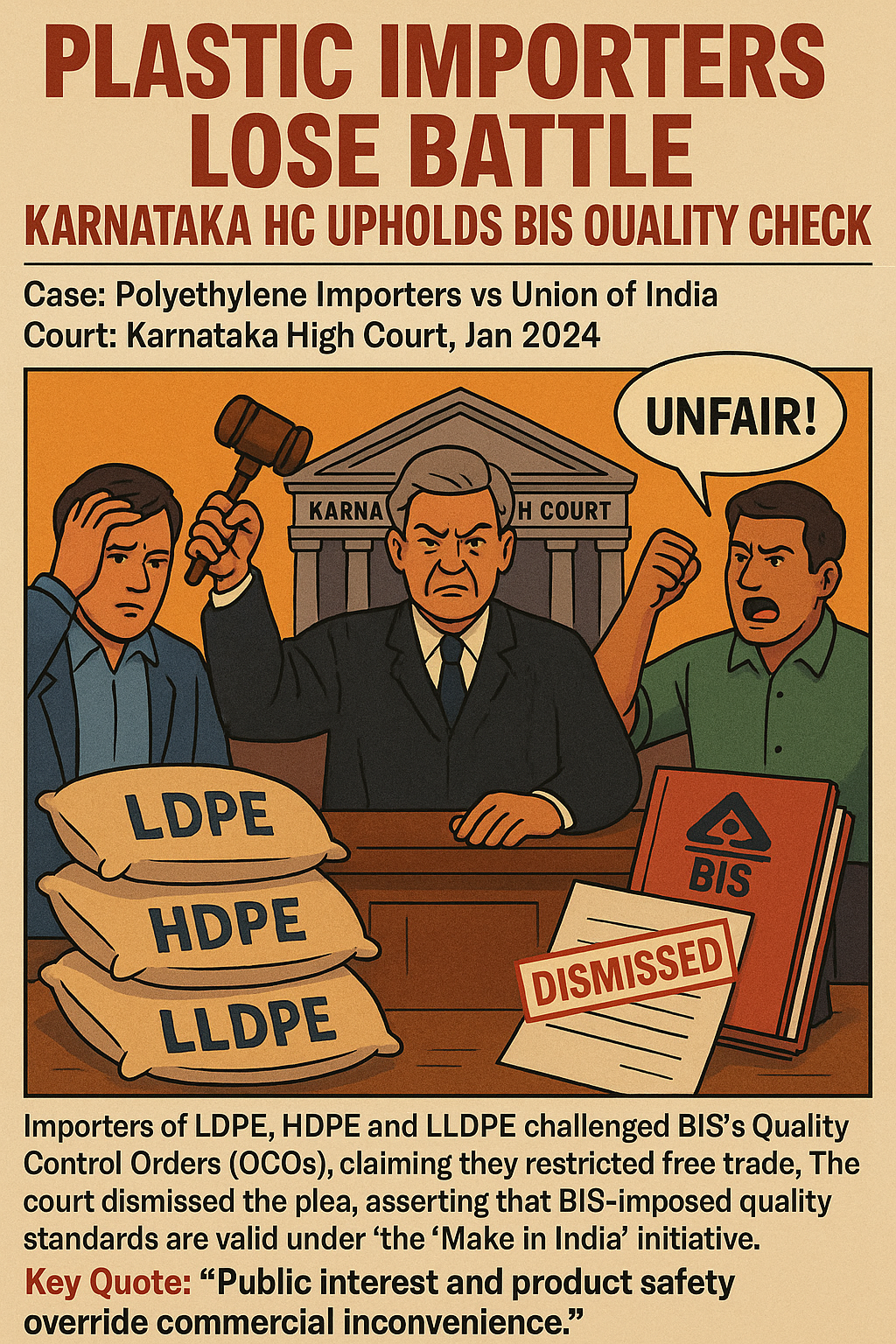
Case: Polyethylene Importers vs Union of India
Court: Karnataka High Court | Date: January 2024
In a major verdict strengthening regulatory enforcement, the Karnataka High Court dismissed a petition by LDPE, HDPE, and LLDPE plastic importers challenging BIS’s Quality Control Orders (QCOs). The importers argued that QCOs restricted free trade and created unnecessary barriers.
Court’s Stand:
The High Court firmly ruled in favor of BIS, emphasizing that quality standards are aligned with the national “Make in India” initiative and serve larger public interest. The commercial inconvenience of importers was held subordinate to safety and quality control.
Key Quote from the Judgment:
“Public interest and product safety override commercial inconvenience.”
Why This Matters:
Reinforces the mandatory nature of BIS standards under QCOs
Strengthens BIS’s position in safeguarding consumer rights
Encourages industries to align with Make in India and quality-first practices
For Stakeholders:
Ensure BIS compliance before import, manufacturing, or sale of regulated products. Courts are siding with consumer safety over trade convenience.
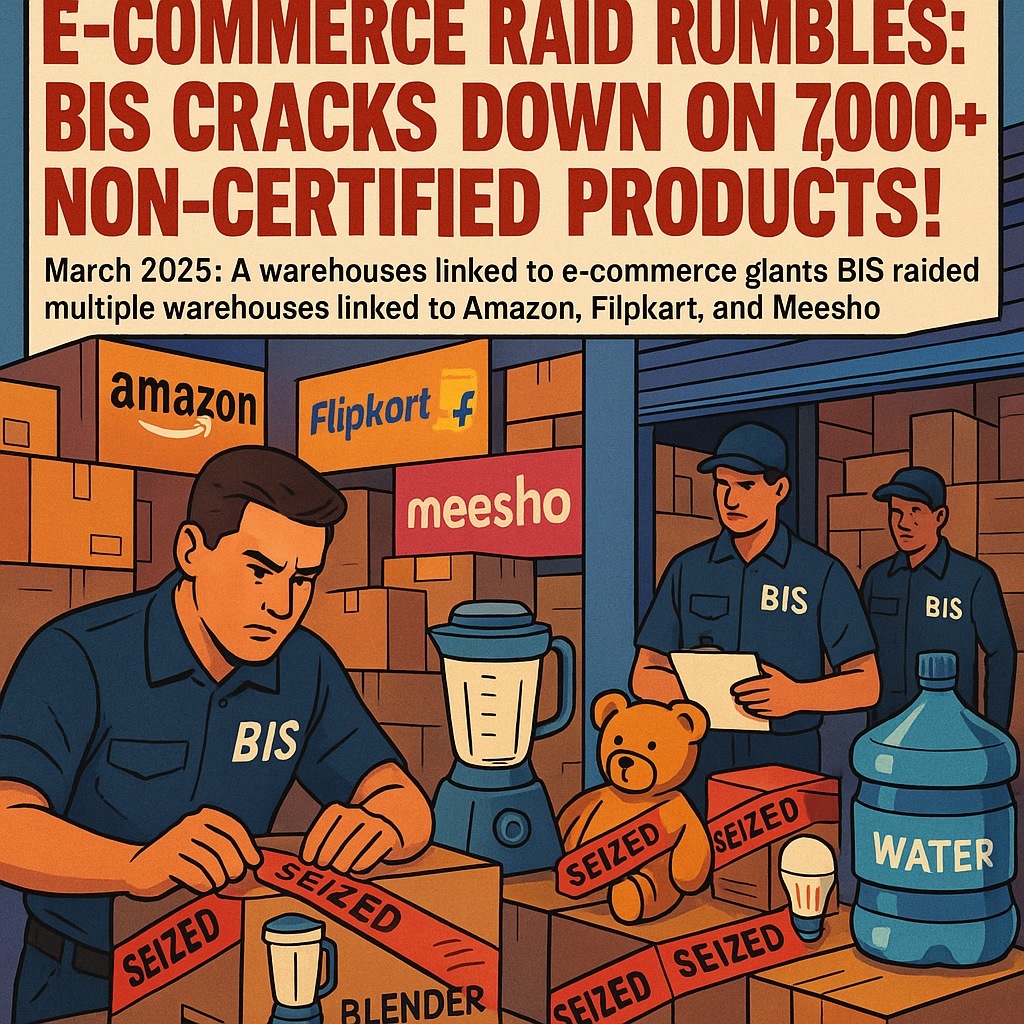
???? E-COMMERCE RAID RUMBLES: BIS Cracks Down on 7,000+ Non-Certified Products!
In a landmark enforcement move, the Bureau of Indian Standards (BIS) has intensified its oversight of e-commerce platforms by raiding multiple warehouses in March 2025. Warehouses linked to Amazon, Flipkart, and Meesho were found to be housing over 7,000 non-certified products—ranging from household electronics to packaged goods and toys.
???? What was seized?
Uncertified blenders
Unsafe toys
Packaged drinking water containers
Miscellaneous electronics and home appliances
???? Why it matters:
This action underscores BIS’s unwavering commitment to consumer safety and regulatory compliance. The raid highlights the increasing pressure on e-commerce platforms and their sellers to ensure that listed products meet mandatory certification under the BIS Act.
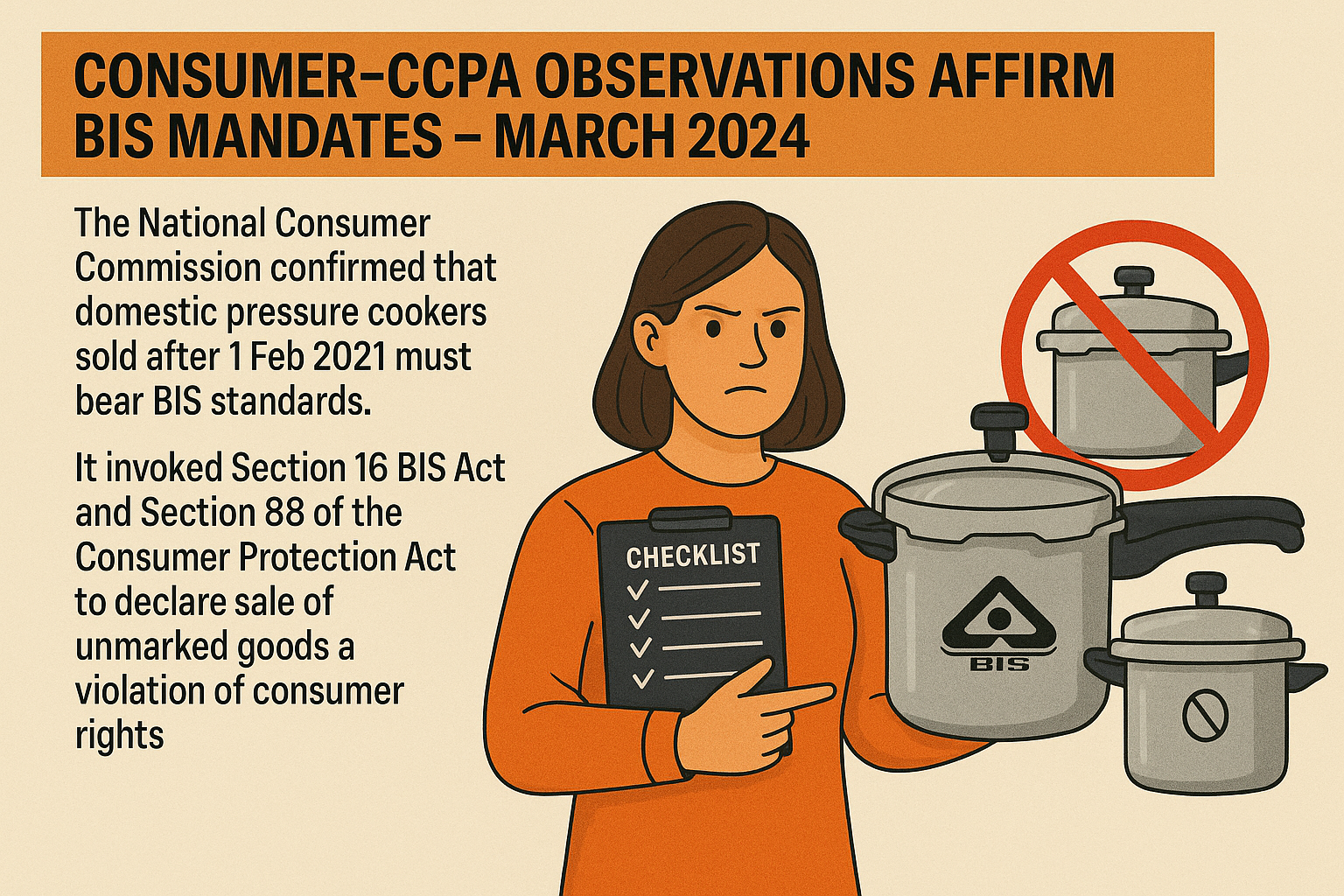
In a significant consumer protection development, the National Consumer Commission has reiterated that domestic pressure cookers sold after February 1, 2021, must comply with BIS (Bureau of Indian Standards) norms.
Key Takeaways:
Non-BIS marked pressure cookers are a violation of consumer rights.
This is based on:
Section 16 of the BIS Act
Section 88 of the Consumer Protection Act
The sale of unmarked or non-certified products is now deemed a punishable offense.
This move strengthens the Consumer Protection (E-Commerce) Rules and ensures that safety and quality standards are non-negotiable in the Indian market.
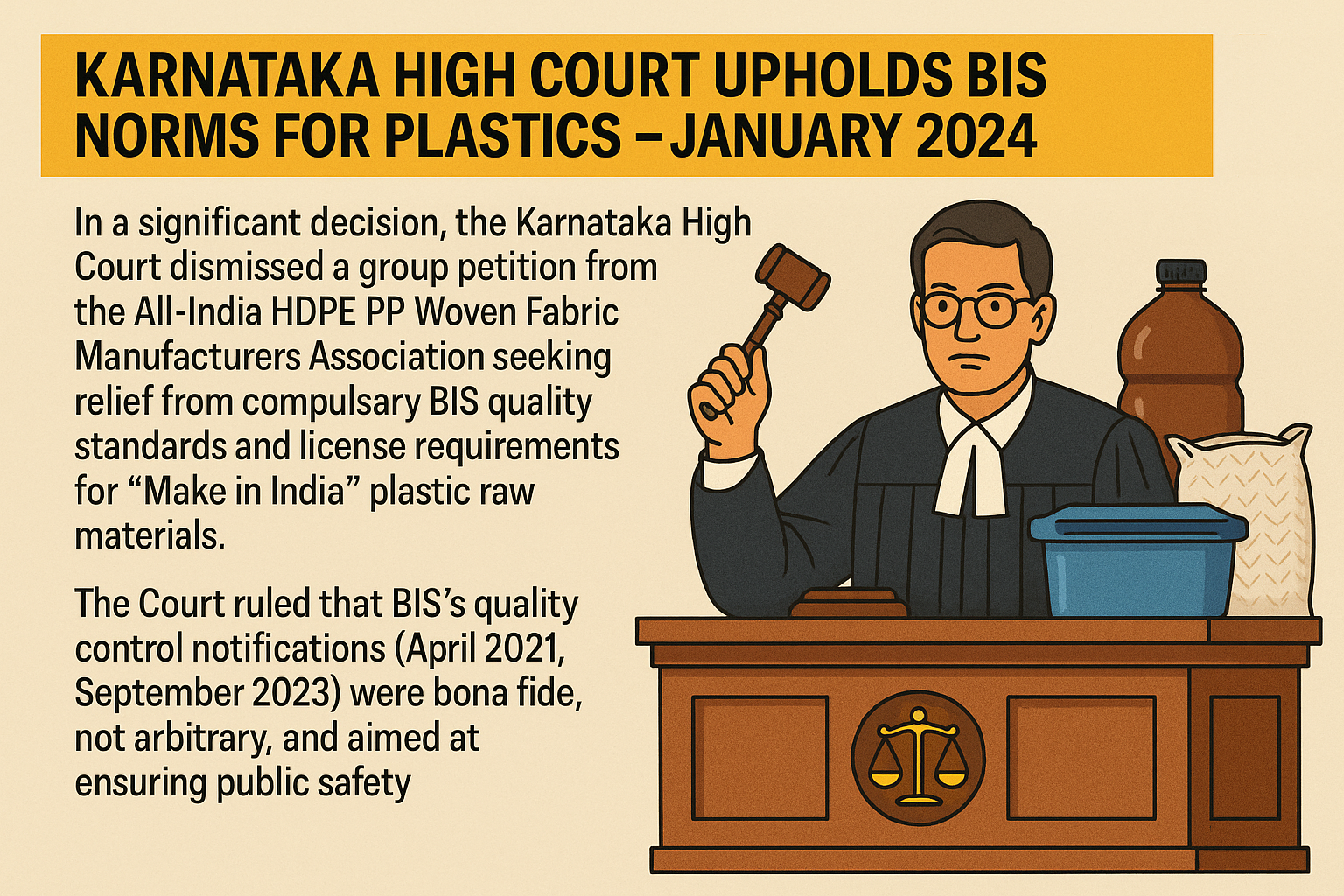
The litigation arose from a writ petition filed by the Woven Fabric Manufacturers' Association, challenging the Central Government’s notification dated April 15, 2021, which mandated BIS certification (conformity assessment) for high-density-, linear low-density-, and low-density polyethylene, effective January 5, 2024.
The petitioners argued the norms would:
Restrict movement of raw materials,
Encourage monopolistic practices (allegedly benefiting Reliance Industries),
Benefit only finished product focus, not raw materials.
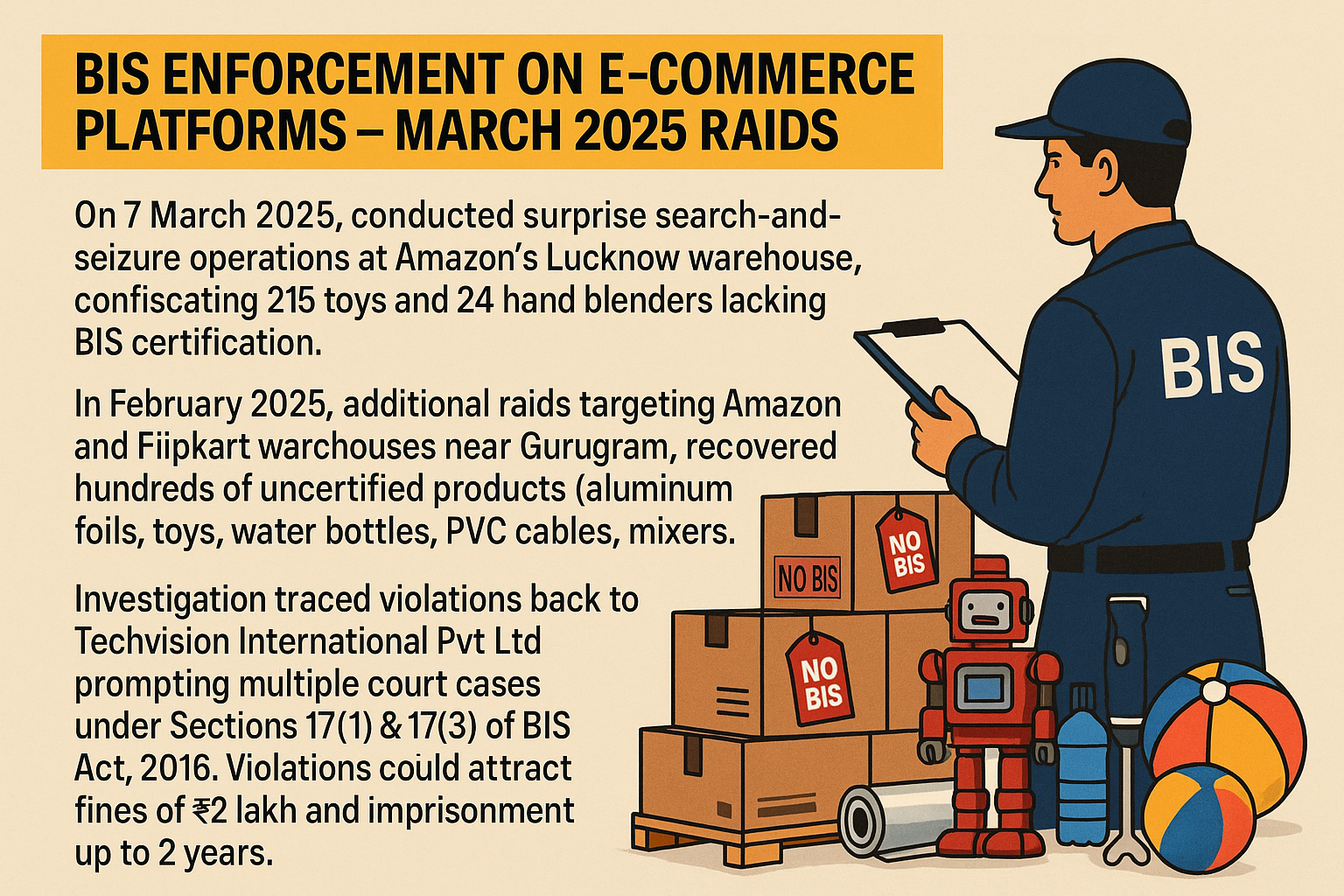
In a landmark nationwide crackdown during March 2025, the Bureau of Indian Standards (BIS) conducted intensive raids on major e-commerce platforms including Amazon and Flipkart, targeting the sale of products without mandatory BIS certification.
Amazon India Sellers Pvt. Ltd. (Mohan Cooperative Industrial Area):
Seized over 3,500 electrical appliances including geysers, food mixers, and room heaters
Estimated value: ?70 lakh
Offenses: No ISI mark or counterfeit labeling
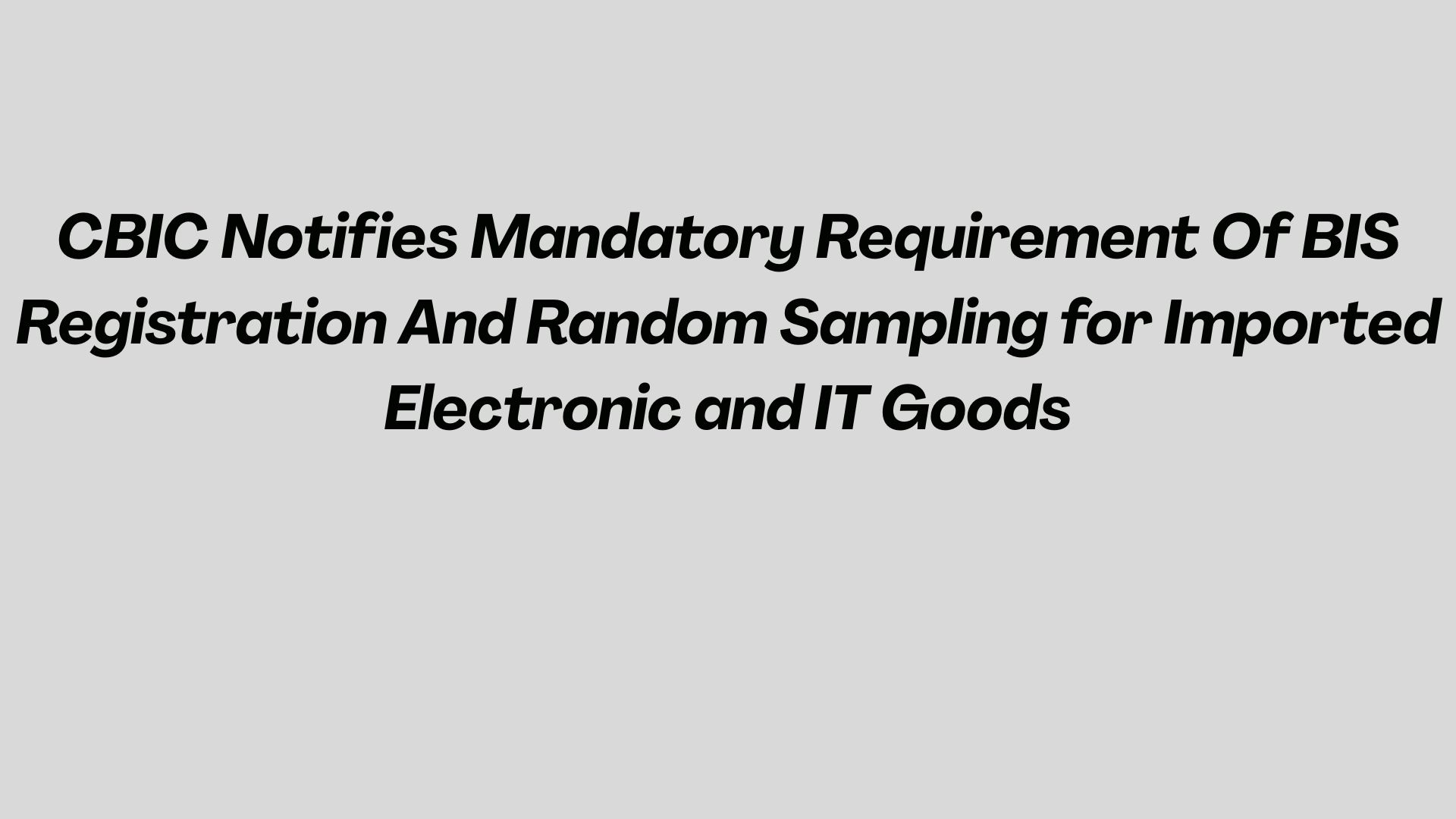
The Central Board of Indirect Taxes and Customs (CBIC) has notified the mandatory requirement of Bureau of Indian Standards (BIS) Registration and random sampling for imported electronic and IT goods.
The CBIC on review of the different practices in the implementation and streamlining the process including sampling issued the directions.The Customs Officer shall check for BIS registration in the system in all cases.
The Risk Management System shall randomly select the consignments for sampling and intimate the Customs Officer through Examination Instructions.
The sample drawn shall be sent to BIS-recognized labs for testing of limited defined non-destructive safety parameters from the IS standard applicable to the product, as identified by MeitY from time to time. The updated data for IS wise list of recognized laboratories along with their complete address can be accessed by putting in the relevant Indian Standard number in the search by IS link on the websiteIn case of goods selected for sampling, Out of Charge (OOC) shall be given only if the sample has complied with the requirements of the standard for the defined parameters as per the test report given by the BIS-recognized Labs. If the sample drawn fails to meet the requirements of Standard, such consignments may be sent back or destroyed at the cost of the importer as per extant rules/procedures.
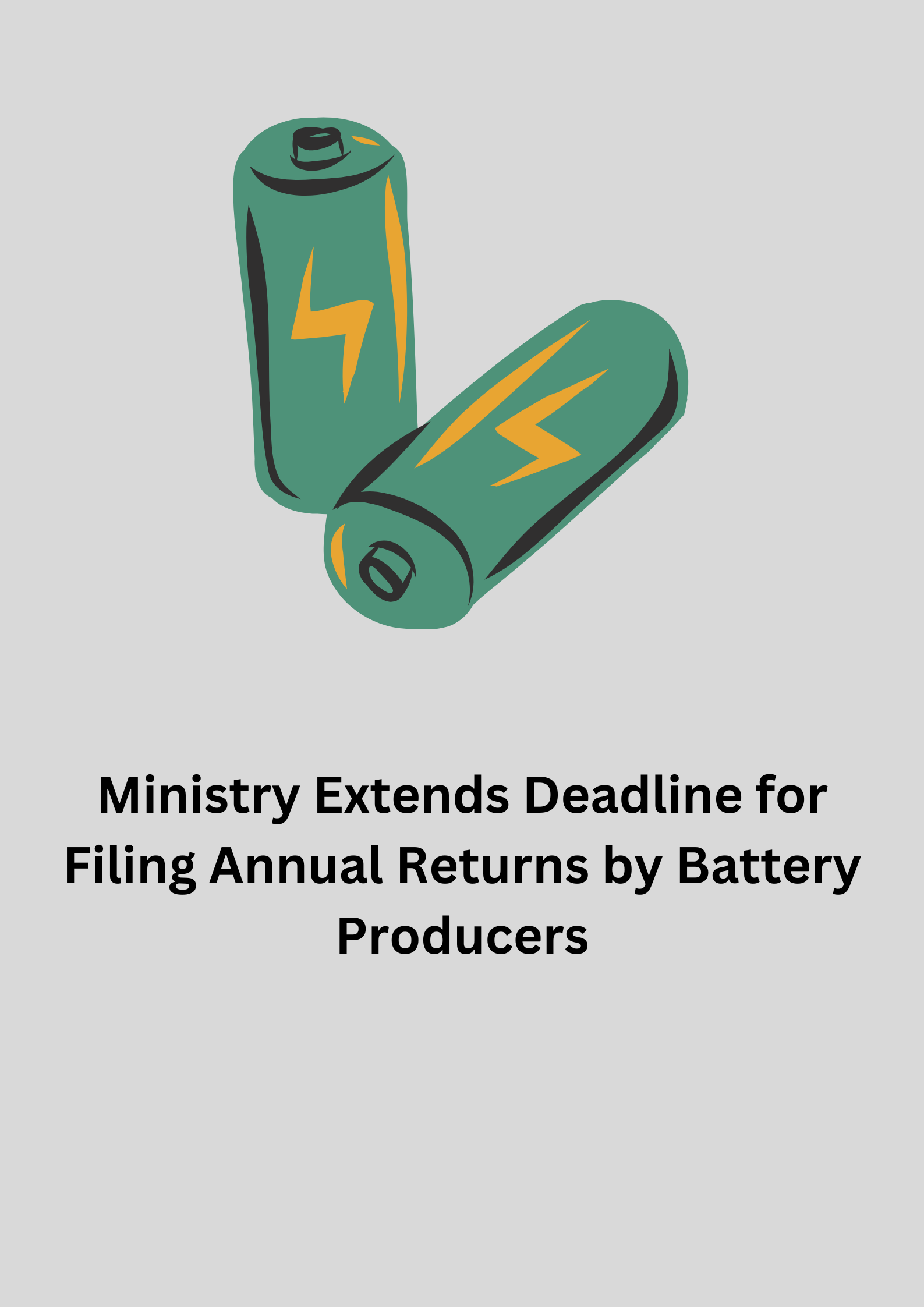
The Central Pollution Control (CPCB) requested an extension of the filing timeline for battery producers' annual returns for FY 2023-24 by 31.03.2025. The Ministry extended the deadline to 31.12.2024, but the Central Government extended it to 31.3.2025, pending approval from the Competent Authority.
 Rules, 2024.png)
The revised regulations specify the minimum proportions of recycled materials that must be present in the overall dry weight of different battery types over the upcoming fiscal years. These guidelines are intended to be progressively raised, pushing the sector toward higher sustainability.
 Amendment Order, 2024.png)
This amendment is a significant step forward in fostering innovation within the toys industry. By easing restrictions on imports for R&D, manufacturers can now explore new designs and materials without the immediate pressure of commercial sales. This will likely enhance the quality and safety of toys produced in India, aligning with global standards. Moreover, the requirement for record-keeping ensures accountability and transparency in the import process, which is vital for maintaining quality control in the industry.
.png)
In a significant step to enforce stricter compliance with environmental regulations, the Central Pollution Control Board (CPCB), under the Ministry of Environment, Forest, and Climate Change (MoEF&CC), has issued a Show Cause Notice to several producers, importers, and brand owners (PIBOs) for violating the Plastic Waste Management (PWM) Rules, 2016, as amended. The notice highlights the failure of these entities to submit their Annual Returns for the Extended Producer Responsibility (EPR) targets for the financial years 2022-23 and 2023-24. This non-compliance raises serious concerns, as it undermines the effectiveness of the nation's plastic waste management efforts and obstructs initiatives to reduce plastic pollution.
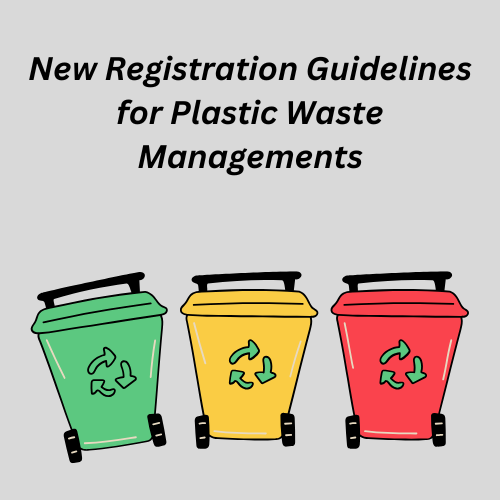
Under the Sixth Amendment to the Plastic Waste Management (PWM) Rules, dated April 27, 2023, Producers, Importers, and Brand Owners (PIBOs) are granted a one-time registration. This registration is valid indefinitely and will only change upon the PIBOs' request. Additionally, a notice issued on August 28, 2023, clarified that these registrations do not require renewal.
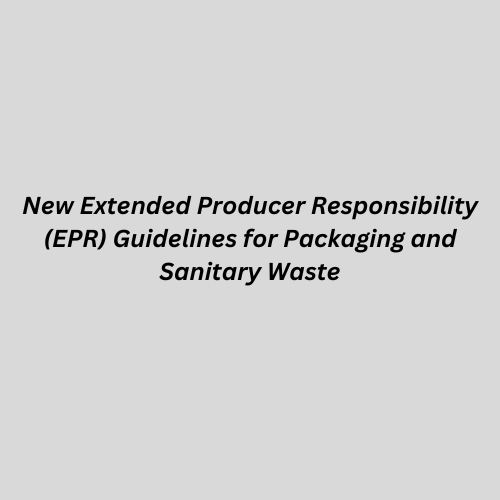
EPR (Extended Producer Responsibility) is a policy that makes companies responsible for what happens to their products after customers are done using them. This means manufacturers, importers, and big brands (PIBOs) must take care of collecting, recycling, and properly disposing of their packaging and products.
The goal is to cut down on waste, encourage the use of recyclable materials, and help protect the environment. Under the new draft rules in India, these companies will have to meet recycling targets, use more recycled materials in their packaging, and set up systems to manage waste effectively. This initiative supports global sustainability efforts and helps create a cleaner, greener future.
 Rules, 2011 (1).png)
Bureau No. CMD-2/G-18 Notification Changes
“(1) For micro, small, and medium-scale enterprises, concession of 20%.”.
“(2A) Enhanced concession for a micro scale enterprise—From the date of this notification till 31
May 2026, a concession of 80% in the fee payable by the large-scale enterprises shall be applicable.
(2B) Enhanced concession for a small-scale enterprise: From the date of this notification till 31
May 2026, a concession of 50% in the fee payable by the large-scale enterprises shall be applicable.”
iii) the sub-paragraph 3 under Note 3 shall be substituted, namely:
“(3) Enhanced concession for a start-up enterprise: From the date of this notification till 31 May
2026, a concession of 80% in the fee payable by the large-scale enterprises shall be applicable.”
iv) the sub-paragraph 4 under Note 3 shall be substituted, namely:
“(4) Enhanced concession for a women entrepreneur enterprise—From the date of this notification
till 31 May 2026, an additional concession of 10% in the fee payable by the applicable scale of
enterprises, i.e. either micro or small or medium scale, shall be applicable.”
 Rules, 2011.png)
The Legal Metrology (Packaged Commodities) Rules, 2011 is a set of regulations in India that govern the packaging and labeling of commodities to ensure consumer protection, transparency, and fair trade practices. These rules come under the framework of the Legal Metrology Act, 2009, which aims to ensure that accurate measurements are used in trade and commerce.

Important update from the Department of Consumer Affairs, dealing with Bureau of Indian Standards that Stainless Steel Seamless Pipes and Tubes for General Services and Stainless-Steel Welded Pipes and Tubes for General Services are now established under Indian Standards in the Official Gazette.
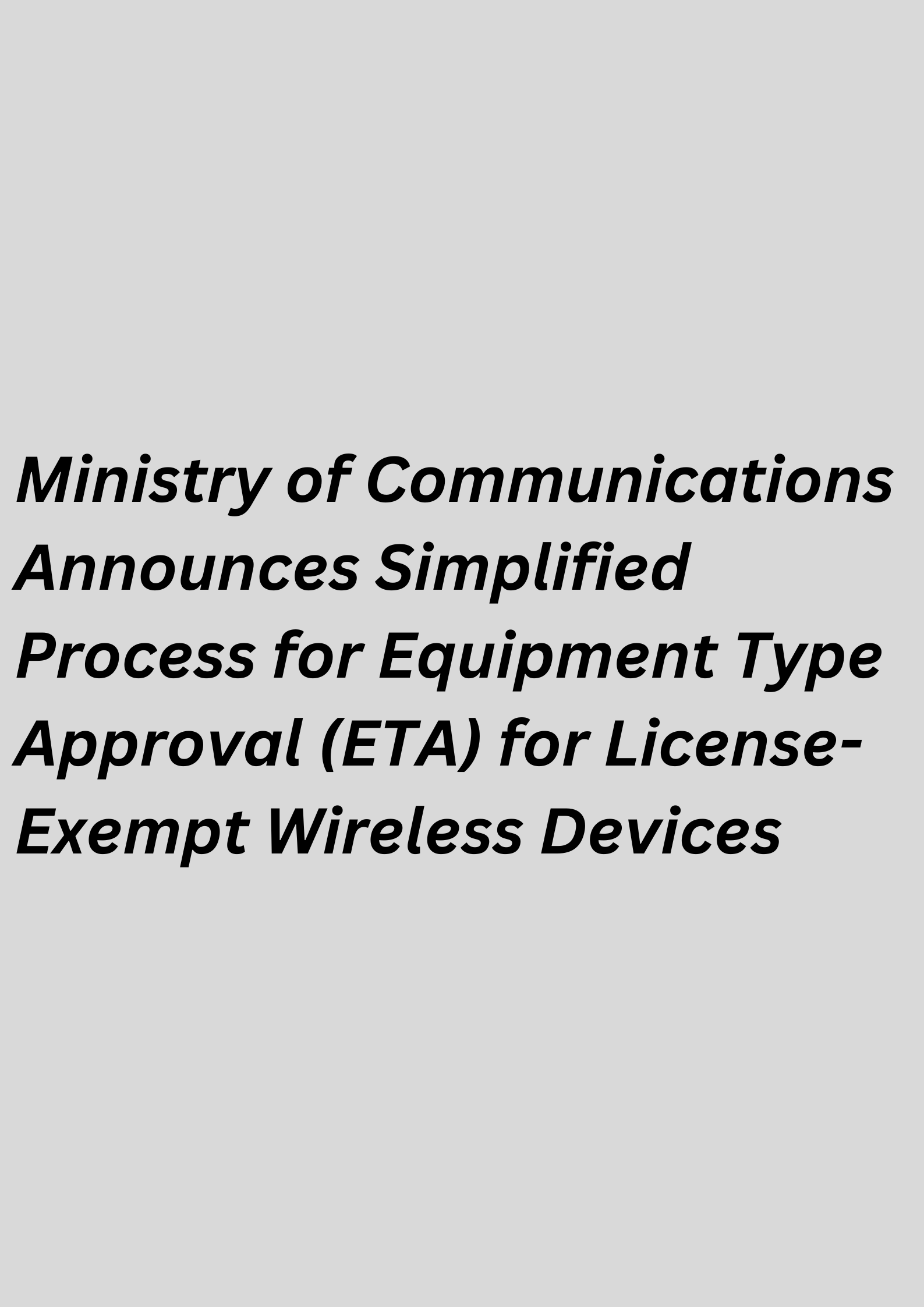
Subject: Issuance of Equipment Type Approval (ETA) for License-Exempt Wireless Devices
The competent authority has decided to grant Equipment Type Approval (ETA) for license-exempt wireless equipment devices on a self-declaration basis. Applicants must submit applications on the SARAL Sanchar portal, with required documents and fees. ETA holders must obtain clearances from the Directorate General of Foreign Trade (DGFT) before importing equipment, and must ensure compliance with import regulations.
 Rules, 2025.png)
The Plastic Waste Management (Amendment) Rules, 2025, will come into force on July 1, 2025. They require producers, importers, or brandowners to provide information in barcodes, product information brochures, or unique numbers on plastic packaging. The Central Pollution Control Board will publish the list of producers, importers, or brandowners who have provided details and product information, updating it every quarter. Non-compliance or contravention will result in penalties under Section 15 of the Act.